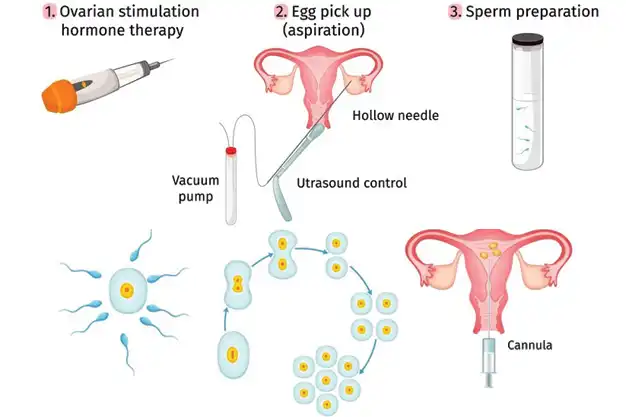 11 Link Road, Lajpat Nagar,
Jalandhar City
11 Link Road, Lajpat Nagar,
Jalandhar City
In Vitro Fertilization (IVF) is an assisted reproductive technology (ART) that involves the fertilization of an egg with sperm outside the human body. The stimulation of the woman's ovaries to create many eggs is followed by the retrieval of mature eggs via a simple surgical procedure. In a laboratory dish, these eggs are fertilized with sperm, resulting in the creation of embryos that are cultured for many days.
IVF is a varied and extensively used fertility treatment that provides hope to people facing various fertility concerns. Its success is impacted by factors such as age, underlying fertility issues, and embryo quality.We are happy to offer In Vitro Fertilization (IVF) at our fertility clinic, a cutting-edge assisted reproductive technology meant to empower individuals or couples battling infertility issues on their quest to motherhood.


IVF increases the chances of conception dramatically, especially for people with complex or unexplained infertility that may not react well to traditional fertility therapies.

A variety of infertility issues, such as fallopian tube blockages, male factor infertility, ovulatory abnormalities, and infertility that remains unexplained, can be addressed using in vitro fertilization (IVF).

Comprehensive diagnostic testing is often part of the IVF procedure, and it offers important information about the causes of infertility and helps determine future treatment strategies.

IVF is very advantageous for tubal factor infertility patients since it avoids complications caused by obstructed or damaged fallopian tubes.

IVF can overcome male infertility by directly injecting sperm into eggs by intracytoplasmic sperm injection (ICSI), allowing for fertilization even when sperm count or motility are poor.

IVF allows for the freezing of embryos to preserve fertility, for persons facing medical treatments or other circumstances that may influence fertility options.

Throughout the IVF journey, our devoted team of fertility specialists provides complete support, guidance, and counseling, assuring a positive and informed experience.
The journey begins with a thorough consultation with one of our reproductive specialists. Medical histories, past reproductive treatments, and individual goals are all examined in order to develop a personalized treatment strategy.
Comprehensive diagnostic tests are conducted to assess reproductive health. This may include hormonal assays, ultrasound examinations, and other tests to identify any underlying causes of infertility.
The woman undergoes ovarian stimulation using fertility medications to encourage the development of multiple eggs. The stimulation process is carefully monitored through hormonal assays and ultrasound scans.
When the eggs attain maturity, a simple surgical procedure is performed to remove them from the ovaries using a fine needle. The eggs that have been retrieved are subsequently readied for fertilization.
The male partner or sperm donor supplies a sperm sample, which is processed to separate high-quality sperm for conception.
In our modern laboratory, the retrieved eggs and sperm are mixed for fertilization. The resultant embryos are cultured in ideal circumstances for several days.
Our team evaluates the quality of the developing embryos and chooses the healthiest ones for transfer. In some circumstances, preimplantation genetic testing (PGT) may be considered to screen for genetic disorders.
One or more embryos are transplanted into the uterus of a woman. The transfer's timing is crucial, and it is frequently established in consultation with our team depending on particular circumstances.
Hormonal assistance, such as progesterone, is given to help the uterine lining and boost the odds of embryo implantation success.
A pregnancy test is performed 10-14 days after the embryo transfer to determine the success of the procedure. If the procedure is successful, ongoing assistance is provided, including early pregnancy monitoring.

Aarti Hospital 2026. All rights reserved.